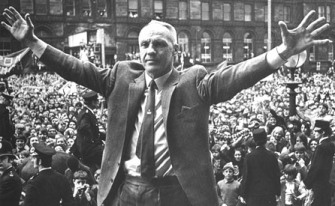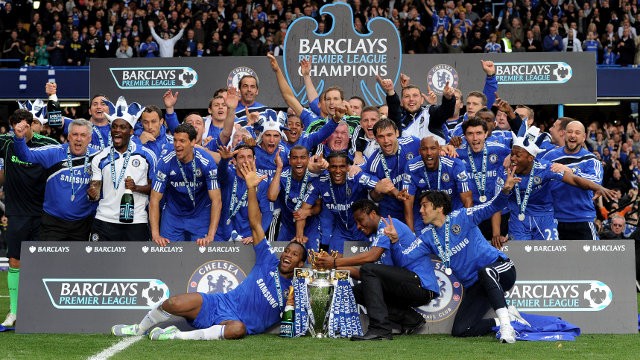If you are first you are first. If you are second you are nothing
Bill Shankly’s oft repeated maxim was probably apt for his era – back in the 1960s and ’70s – when clubs actually needed to be champions to get into the European (Champions) Cup. An era in which there was little consolation for finishing second – let alone third or fourth.
It’s fair to say those days are long gone and Shankly’s mantra doesn’t hold true anymore. Not when it comes to league football, anyway. Definitely not with the prestige and wealth of the Champions League so dominant. Not in these times, when a fourth place finish in England could – barring a play-off upset – grant passage to the world’s biggest club competition. Such is the draw of the Champions League now that, Manchester United’s Europa League win last May would have barely been consolation for a disappointing Premier League campaign, had it not come with the golden ticket of Champions League qualification.

Think about it: Real Madrid have won the Champions League in three of the last four seasons, yet, they will enter this year’s competition as champions of Spain for the first time since 2012 – and for only the second time in a ten-year span in which they have also reached four other Champions League semi-finals. You’d forgive them for objecting to the whole “second is nothing” thing.
Yet, we also live in a time when managers are generally rated on account of the honours – trophies – they’ve won. How often have we heard: “… but he’s never won anything”…? Yet, that on its own hardly seems a fair measure of a manager’s ability. After all, the visionary Ariggo Sacchi hadn’t won anything prior to arriving at Milan in 1987.
Football, for all the talk of strategy and tactics, is not chess, in which each player comes to battle with the same inanimate pieces on a board; nor is it tennis, where each player wields a similar racquet and success is purely down to individual ability. Certainly, football managers don’t compete on such terms.
Resources and expectations must surely come into it, and that colours the trophy criterion. That’s why, after winning three straight Bundesliga titles with Bayern, there’s still debate as to whether Pep Guardiola’s tenure in Bavaria was a success or not. He won trophies, but not “The Big One”, which Bayern’s clout and reputation demand. On the other hand, can one argue that trophy-less Ralph Hassenhutl – who’s newly promoted RB Leipzig finished second in Germany – had anything but a successful 2016/17 season? Or has Mauricio Pocchetino’s performance in leading Tottenham through two impressive title chasing campaigns been undermined by a lack of trophies?
Then there’s the competitive context. Watford manager Marco Silva arrived at Hull last season, relatively unknown but with a league title with Olympiakos to his name. No disrespect, and there is more to Silva than that title, but is a league title in Greece – with Olympiakos, champions every year since 2011 – a bigger achievement than Brendan Rodgers’ second place finish with Liverpool in 2014? For that matter, does Rodgers’ excellent treble-winning achievement with Celtic last season surpass finishing ahead of Jose Mourinho and Arsenal Wenger in 2014? Of course, Rodgers has the trophies to his name now, but Celtic are expected to dominate in Scotland anyway, which – like with Pep at Bayern – takes a bit of shine off things. Rodgers’ Liverpool weren’t even expected to make the top four.
Managers who win trophies at top clubs – or dominant clubs in their context – certainly deserve credit. Yes, they tend to have better players to work with, but resources and expectations bring their own pressures and challenges as well – even the Galacticos needed coaching.
But those who achieve some success, relative to their competitive strength – even without trophies – deserve a bit more nuance in assessments of their performance. Leading an “underdog” to third place doesn’t come with trophies; but it may well be a greater achievement than winning with the favourites.
The real stand-outs, of course, are those who somehow overcome the odds to win trophies.
Jose Mourinho, for instance, did not earn his reputation for winning a league title at Porto. He truly arrived when he surprisingly led them to the Champions League in 2004. Rafa Benitez took Valencia to two La Liga titles despite competing against the powers of Barcelona and Real Madrid, and then topped it with a most unlikely Champions League triumph with Liverpool. Jurgen Klopp won back-to-back titles with Borussia Dortmund, interrupting what has become a six-year Bayern winning streak.
The Premier League throws up a unique context this season: Several wealthy clubs and some of the most highly rated managers in world football means there is no one – or two – dominant power. That should make for a fascinating contest, and means a handful of clubs – certainly their fans – will harbour real expectations of taking the title.
Obviously, only one can. But, thankfully, finishing second – or third, or fourth – no longer means “nothing”.










I like this from a slightly different angle.
One major thing the world has robbed itself of (greatly helped by the media) is the art of ‘interpreting context’.
Thats why I hope many many people read this piece so that mostly ignorant Social Media users and football fans can actually learn how to analyse and interprete situations, statements etc instead of just jumping into arguments with stupid viewpoints and comments.